Google Cloud outlined a series of services and enhancements across its platform in a bid to make it easier for enterprises to bring their data to generative AI models, build applications and deploy them at scale. Google Cloud's data analytics services will unify under the BigQuery umbrella and Vertex AI becomes the venue to tune, orchestrate and deploy models.
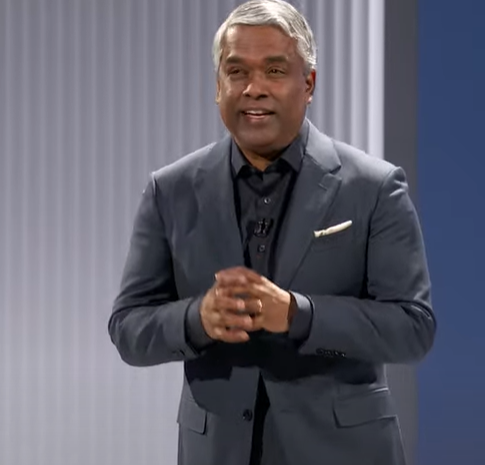 Ultimately, Google Cloud is bidding to be the AI optimized stack of choice that will enable companies to deploy a series of agents that can automate workflows and carry out tasks. And by the way, Google Cloud is offering model choices, but is embedding Gemini everywhere.
Ultimately, Google Cloud is bidding to be the AI optimized stack of choice that will enable companies to deploy a series of agents that can automate workflows and carry out tasks. And by the way, Google Cloud is offering model choices, but is embedding Gemini everywhere.
Google Cloud CEO Thomas Kurian (right) said:
"We're building AI to be an open, vertically optimized stack. This stack consists of advances with our AI supercomputer, which is now used by over 90% of AI unicorns. There are advances to improve the efficiency and scale of training and serving and a wide portfolio of different kinds of system optimizations, allowing us to provide developers and organizations with the market leading cost performance for training and inferencing models."
Kurian added that Google Cloud Next 2024 will include more than 1,000 new products and features across its platform. "We continue with our strategy to help organizations drive digital transformation using our cloud platform and AI," said Kurian.
- Google Unveils Ambitious AI-Driven Security Strategy at Google Cloud Next'24
-
Google Cloud Next: The role of genAI agents, enterprise use cases
Here's the Google Cloud vision in two slides.
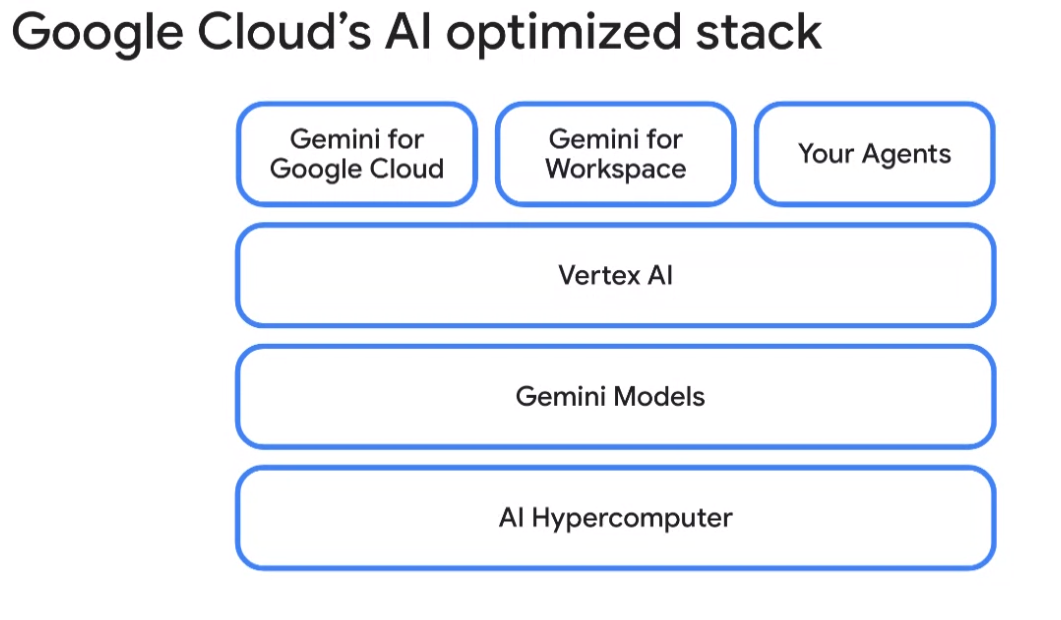
Leading to...
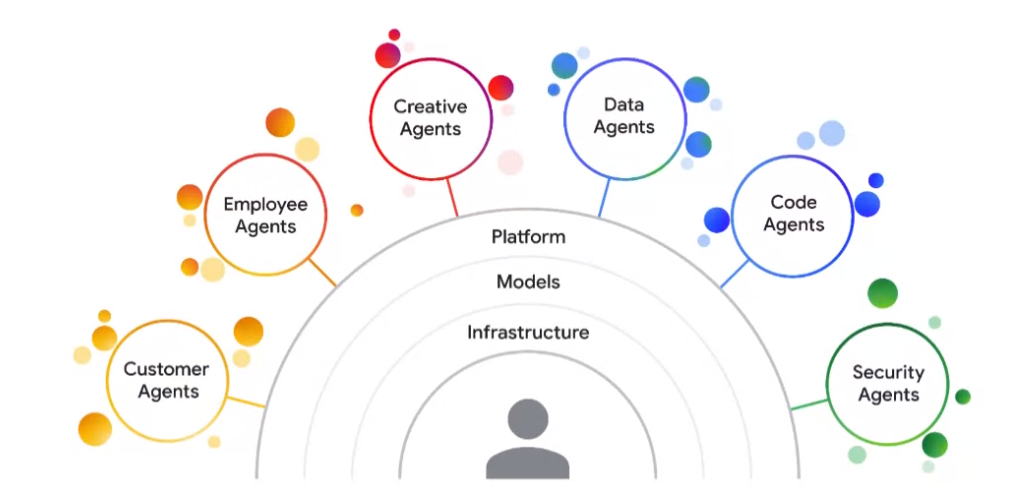
The announcements filling out this vision are plentiful, but here are the big launches.
- At the infrastructure layer, Google Cloud outlined the latest GPU/TPI support, PyTorch enhancements, Axion, Google's first custom designed Arm processor, and confidential computing enhancements. Distributed Cloud will be aimed at sovereignty workloads and AI anywhere use cases.
- Google Axion delivers up to 50% better performance and 60% better energy efficiency compared to x86 based instances.
- Google Cloud said that Nvidia's latest Grace Blackwell GPUs will be served up as instances in early 2025. The company also outlined A3 Mega, a generally available instance tht has twice the bandwidth per GPU compared to A3 instances.
- On the model choice front, Google Cloud general availability for Gemini 1.0 and Gemini 1.5 Pro in public preview as well as Grounding on Google Search that will provide fresh information that's grounded. Google Cloud also announced Imagen 2.0 Editing in GA and private preview of text to live image, LangChain on Vertex AI and Vertex AI Prompt Management and Assistance.
- Gemini is being added to BigQuery, Databases, Vector indexing and Looker to name a few. Gemini is also being added to Google Cloud's security offerings.
- Google Workspace will get Google Vids, a way to collaborate and tell stories at work via Gemini, Vertex AI and Workspace integration and an add-on SKU for Gemini Meet/Chat that will be $10 per month per user.
- For databases, Gemini will power an AI database assistant across Google's offerings. AlloyDB will also add an extension for faster vector search and AlloyDB for LLMs will be able to retrieve information with natural language. Vector support and integration with LangChain will be deployed across Google databases.
- On data analytics, BigQuery will become a unified platform for data to AI to support multimodal data and workloads with Gemini and a series of AI integrations. Specifically, BigQuery upgrades include a metastore for a unified data foundation, unified governance and cataloging and the addition of Apache Spark and Apache Kafka integration. Google Cloud is putting all of its data analytics services together on BigQuery.
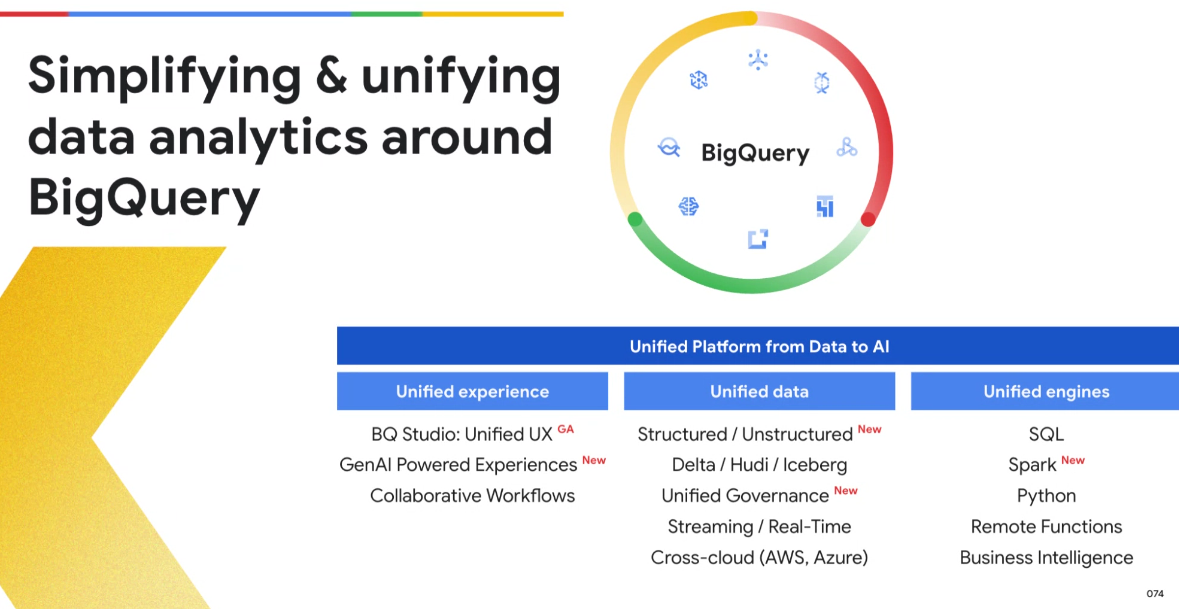
- With security, Google is using Gemini for SecOps and Threat Intelligence as well as adding an enterprise browser for Chrome.
- Developers will get Gemini Code Assist, Cloud Assist for cloud operations and insights, and enhanced integrations with partners such as Datadog, DataStax, Elasticsearch, HashiCorp, SingleStore and Redis.
- Customer references cited by Google Cloud for AI adoption include Bayer, Best Buy, Discover Financial and TD Bank to name a few. Also see what Equifax and Wayfair have done with Google Cloud.
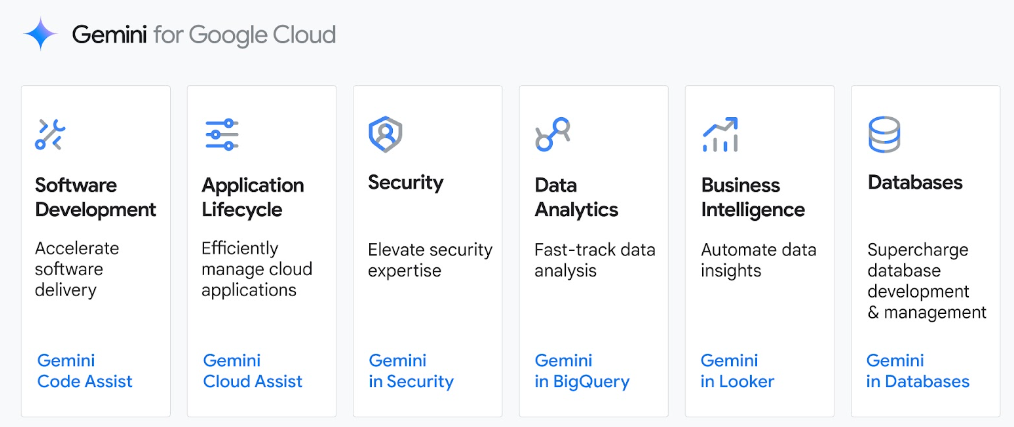
The race with AWS and Microsoft Azure
Google Cloud is No. 3 among the hyperscale cloud vendors, but Kurian said the company has a real play for deploying AI models and its data platform. "Customers want three things. They want a platform that allows them to build deploy AI models at scale. They want that platform to be differentiated. They want an organization that owns its own models and is able to vertically optimize the models. And they want integrated AI across the portfolio," said Kurian.
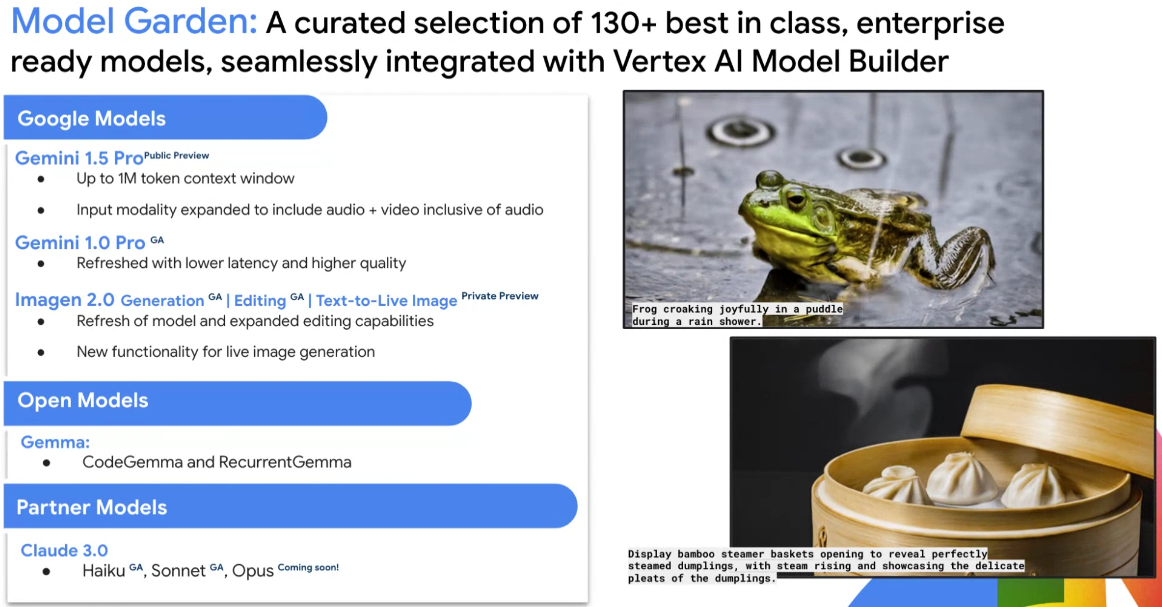
Kurian also touted model choices, which is something AWS recently spoke about with Bedrock. Kurian said grounding of models will also be critical. He said:
"We're introducing grounding with Google search. Not just grounding on your own enterprise data, and then evaluating. We provide that platform that offers a set of services that works with all the models. People are able to choose the platform and then choose the latest model or the best model for their needs. Many organizations now recognize that they need to take an enterprise AI platform, not pick a model. Models are changing week to week, month to month. They need a common foundational platform to do that."
Ultimately, Kurian is betting that Google Cloud and gain ground with a series of AI agents that can carry out tasks, understand processes and context and orchestrate workflows. He said customers are using a combination of Google Cloud building blocks "not just to do individual tasks but to orchestrate process flow."
Ultimately, cloud providers are looking to evolve to become the model orchestration layer for AI.
- AWS, Microsoft Azure, Google Cloud battle about to get chippy
- Google Cloud CEO Thomas Kurian on DisrupTV: Generative AI will revamp businesses, industries
- AWS, Microsoft Azure, Google Cloud themes: Optimization, generative AI and the long game
- Google Cloud rolls out Gemini models to Vertex AI customers, Gemini 1.5 in private preview
- Google Cloud's healthcare push accelerates with Vertex AI, MedLM, Healthcare Data Engine
Google Cloud agents everywhere
The linchpin of Google Cloud's agent vision revolves around Vertex AI, which will include an Agent Builder and Model Builder to go along with a wide selection of models.
Agent Builder will feature no code, low code and full code varieties to orchestrate, ground and augment models, take action and process documents.
In a blog post, Kurian outlined the importance of agents to the generative AI landscape. He said agents can understand multi-modal information and learn overtime to handle transactions and business processes over time. Best Buy, Etsy, The Home Depot and ING Bank are uutilizing agents.
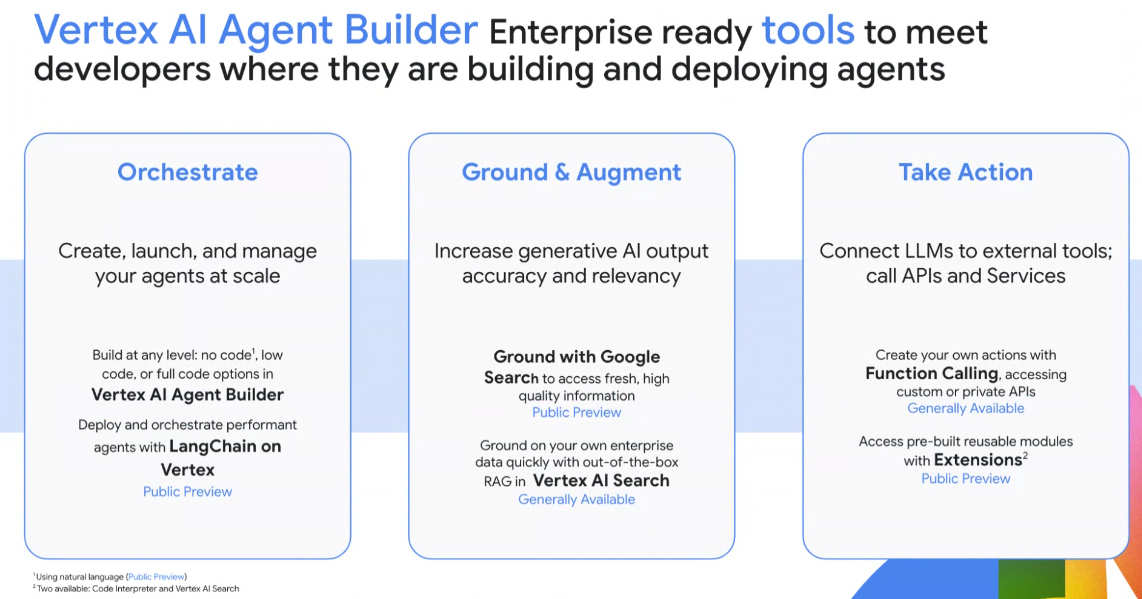
Kurian and Google Cloud executives said these agents can be deployed in multiple contexts and venues including contact center, security, healthcare, retail and media to name a few. The consolidation of data analytics under BigQuery in a unified platform will hand off to Vertex AI.
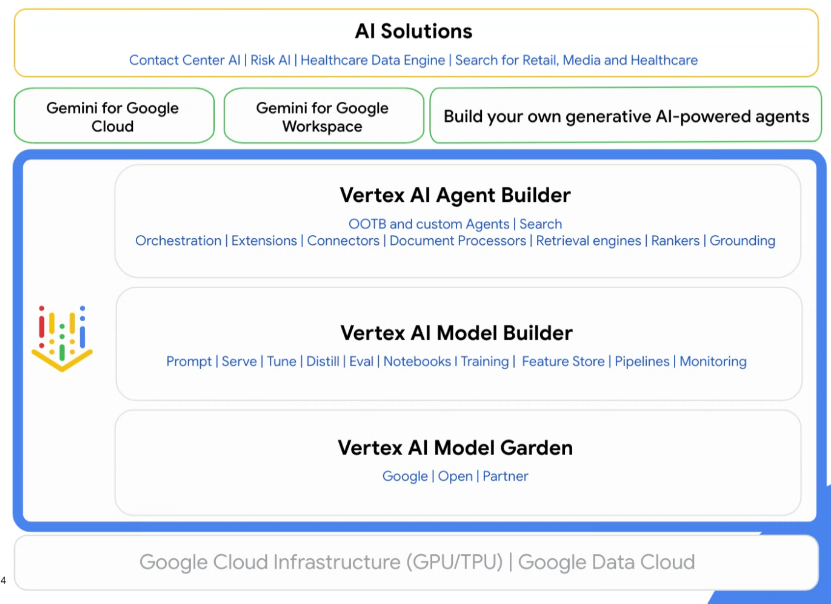
Google Cloud will also layer in a series of MLOps services to bring generative AI from pilots to production including prompt management to create a feedback loop to continually improve and revise prompts.
Constellation Research's take
Constellation Research CEO Ray Wang said the following announcements stuck out on Day 1 of Google Cloud Next:
- Gemini is now across software development, application life cycle, security, data analytics, BI, and databases.
- Model selection. Customers want to bring their own models and being able to choose from Gemini, Lensa, Gemma, and Athropic is what customers want.
- Google Cloud is providing choice in chips from TPUs, to Nvidia GPU's to CPUs in the data center.
- Security models allow for air gap capabilities meaning it works great for government. Threat intelligence was beefed up.
- Google Workspace is getting some new features from Vids to AI meetings that will take notes in 69 languages.
Constellation Research analyst Doug Henschen covered many of the announcements, here's his take on the Google Cloud Next news:
Gemini integration into BigQuery, Looker and GCP's databases. Henschen said:
"It’s significant both in terms of the depth and breadth of GenAI capabilities promised both within each product and across the entire portfolio of services. Focusing on BigQuery, the breadth of Gemini assistance is a differentiator, spanning from ingestion, data preparation, cleansing, and low-code data pipeline building to query recommendation, query cost and performance optimization, semantic search, and Python and SQL code generation."
What Gemini brings to the data platform. Henschen said:
"GenAI capabilities are showing up in a lot of databases, but Google is going deeper and doing it more comprehensively across its portfolio. The capabilities are still in preview, mind you, but Google has also updated the underlying model since last year’s Duet announcements. Google says Gemini will deliver higher accuracy and better performance at a lower cost. As with most GenAI features, the promise is making sophisticated tasks easier for untrained users while improving the productivity of more experienced users."
Google Cloud's AI strategy to date. Henschen said:
"Google's data and AI strategy is about delivering a comprehensive platform with well-integrated capabilities so you can do it all without having to move data around or cobble together disparate services. BigQuery, in particular, has become the focal point, with tight integration with Vertex AI, for AI, ML and GenAI, and Google Looker, for analytics. Another differentiator is multi-cloud support through BigQuery Omni access to other clouds as well as enterprise applications, such as Salesforce, with a new Zero-ETL capability."
Google Cloud's analytics strategy relative to rivals. Henschen said:
"It’s not just about tacking on GenAI features. The big push across all the hyperscale clouds it to offer a single platform for data that seamlessly supports all your AI, GenAI, analytics and wider application development and operational needs. That’s also Microsoft’s push with Fabric and AWS’s push with its extensive portfolio of services. I give Google credit for bringing together a well-integrated platform centered around BigQuery and Vertex. AWS, for its part, has been doing more integration across its vast portfolio of services in recent years. Microsoft Fabric is very new and unproven at this point, but it’s also messaging about doing it all with one platform, putting an emphasis on familiarity and ease of use."
What Google should do next. Henschen said:
"I’d say Google just needs to stick to its strategy, which has been very consistent. Google BigQuery and Vertex AI are strong, well-integrated services that are only getting stronger. Google Cloud is playing catch-up a bit on the transactional side with AlloyDB, which is a much more recent introduction that goes up against Amazon Aurora. I’m sure Google will keep on improving that product while also retaining the open partnerships it has had with leading independents, such as MongoDB. Google leads with its strengths, but openness to third-party vendors and model providers has been another consistent and important part of the Google Cloud strategy."


